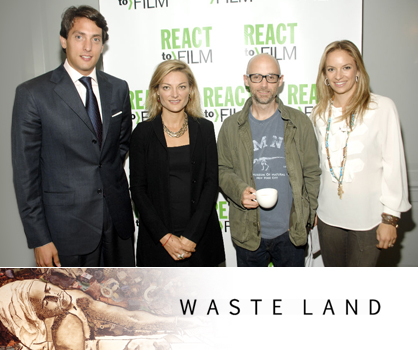‘Waste Land’ shows at Soho House
This past Monday night, film lovers and creative minds alike gathered at Soho House for a screening of “Waste Land,” the latest film in the REACT TO FILM series, started by Coralie Charriol and Dennis Paul in June 2009 in New York City.
Those from both the social worlds and the media worlds—which often collide in New York—were on hand to see the documentary film that follows renowned artist Vik Muniz as he journeys from his home base in Brooklyn to his native Brazil and to the world’s largest garbage dump, Jardim Gramacho, which lies on the outskirts of Rio de Janeiro. There he photographs an eclectic band of “catadores”—self-designated pickers of recyclable materials. Muniz’s initial objective was to “paint” the catadores with their garbage. However, his collaboration with these inspiring people, as they re-create photographic images of themselves out of garbage, becomes much more than a mere artistic endeavor. The film is utterly moving and reveals both dignity and despair as the catadores begin to re-imagine their lives.
Lucy Walker, the filmmaker, was granted access to the entire process and, in the end, offers stirring evidence of the transformative power of art and the alchemy of the human spirit.
“I have always been interested in garbage: what it says about us, what in there embarrasses us, and what we can’t bear to part with,” Walker said.
Walker tells what led her to ultimately make the film.
“When I was a graduate film student at NYU, I started training with the NYU Triathlon Club. As we endured the most grueling 6 a.m. workouts imaginable, I bonded with fellow triathlete Robin Nagle, a brilliant professor who was teaching about garbage. Listening to Robin talk about her work was so fascinating that I began sitting in on her Ph.D seminar,” Walker said.
The filmmaker went on to speak about a field trip taken with Nagle to the Fresh Kills Landfill in Staten Island in the spring of 2000. Shocked at the nightmare quantities of plastic bags and the pipes out-gassing methane poking up through the giant mounds of garbage, she found it almost parody-like. There were—as one would expect—rats, seagulls and dogs everywhere, accompanied by a putrid smell.
After meeting Muniz and making the film of his trip to Jardim Gramacho, Walker saw that it was the intersection of art and humanity that emerged as the central theme of the work. Collaborating with Muniz was nothing short of a rewarding experience for her:
“As an artist, Vik plays between these levels of proximity and distance, between showing the viewer the material and showing them the idea, revealing the relationships in between,” Walker said. “For me this film, as with all of my work, is about getting to know people you don’t normally meet in your life. And, if I’m doing my job, I aim to create an opportunity for the audience to feel they are getting under the skin, to emotionally connect with the people on the screen.”
Perhaps one of the most relaxed “stars” to be found anywhere was Moby. While holding a steaming cup of green tea, he posed for photographers in jeans and army fatigues.
The musical artist answered questions for the crowd after each of two screenings that night. Moby offered his haunting and endearing music for the film and commented, along with Walker, on the process and the film. He admitted he gave Walker free reign to use any music she chose, hardly knowing what the end result would be until having seen the final cut:
“Lucy told me she was going to make a film about Brazilian garbage pickers, and I thought, ‘Uh-huh …’ It turned out to be the best film I’ve ever seen my music in,” Moby said.
Moby, a stringent vegan and animal rights activist, is never one to shy away from an issue, no matter how visceral. It was no surprise that he found the environmental aspects of the film extremely urgent, never mind also finding it a tremendous film done by his lifelong friend.
“I think it’s a remarkable, inspiring film,” he said.
A group of special guests was also invited for the evening, serving as unofficial hosts: Carlos Miele, the renowned fashion designer; Carlos Souza, of Valentino; Santiago Barberi Gonzalez, president of luxury handbag and accessories company Nancy Gonzalez; and Marisa Brown, the young social. Having people of this caliber associated with the project not only drums up interest among those within their social circle, and those without, it furthers interest in the documentaries and awareness of the issues that they address.
Charriol and Paul’s series and the impact it has made in just a short amount of time has impressed Barberi Gonzalez.
“With the REACT TO FILM series, Coralie and Dennis are making people think! And dream about how to change the world for the better,” Barberi Gonzalez said.
Brown, too, found it a moving piece of work, and one that motivates people in a positive direction.
“This is a film that everyone should see. It goes way beyond the subject of renewable materials and ecological issues. It delves into the human spirit in a huge way and shows what we can do to help each other—all through the power of art,” Brown said.
In founding the series, Dennis Paul found “Waste Land” to be a powerful work about art and transformation.
“You see the ability for people with literally nothing to become a part of a beautiful art project, and, ultimately, in some cases, see how that artistic process changes their lives and the lives of many others around the world,” Paul said. “You have to see the film to see what I mean!”
“Waste Land” opens to audiences worldwide Oct. 29, showing in theaters as close as SoHo, New York, and as far away as Poland. It is truly not to be missed.
REACT TO FILM focuses on issue-based documentaries shown in front of an intimate audience, which gives it the kind of targeted viewing these films deserve. Founders Charriol and Paul, who are married and live in Manhattan with their family, are very socially active New Yorkers who long to spread their love of film. With the REACT TO FILM series, they aim to expose viewers to an important issue, engage them in a conversation about that issue, and ultimately inspire them to change the way they think and at the same time influence the people around them.
Future screenings for REACT TO FILM are planned for this year and the next in major cities across the U.S. and abroad.
Tagged in: lux exclusives, film, documentary, garbage, recyclable material,

React to Film



